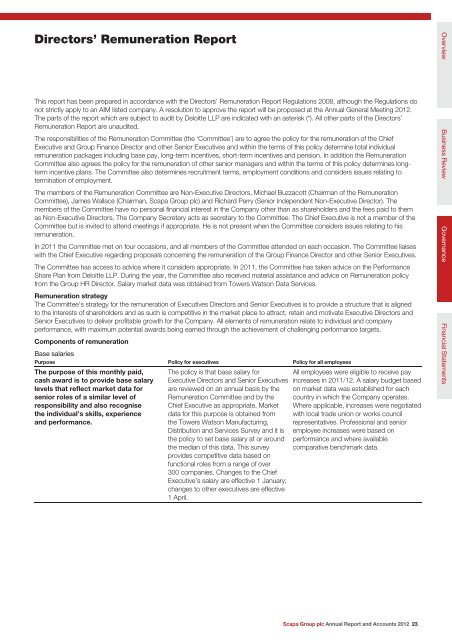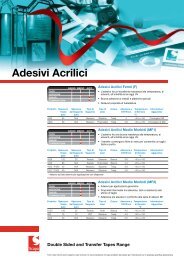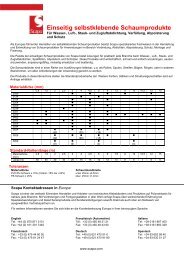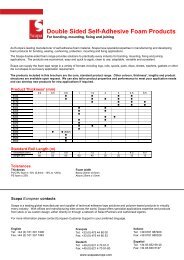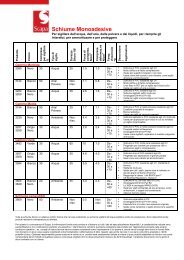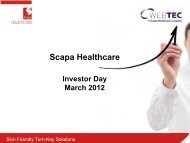Annual Report and Accounts 2012 - Scapa
Annual Report and Accounts 2012 - Scapa
Annual Report and Accounts 2012 - Scapa
You also want an ePaper? Increase the reach of your titles
YUMPU automatically turns print PDFs into web optimized ePapers that Google loves.
Directors’ Remuneration <strong>Report</strong><br />
This report has been prepared in accordance with the Directors’ Remuneration <strong>Report</strong> Regulations 2008, although the Regulations do<br />
not strictly apply to an AIM listed company. A resolution to approve the report will be proposed at the <strong>Annual</strong> General Meeting <strong>2012</strong>.<br />
The parts of the report which are subject to audit by Deloitte LLP are indicated with an asterisk (*). All other parts of the Directors’<br />
Remuneration <strong>Report</strong> are unaudited.<br />
The responsibilities of the Remuneration Committee (the ‘Committee’) are to agree the policy for the remuneration of the Chief<br />
Executive <strong>and</strong> Group Finance Director <strong>and</strong> other Senior Executives <strong>and</strong> within the terms of this policy determine total individual<br />
remuneration packages including base pay, long-term incentives, short-term incentives <strong>and</strong> pension. In addition the Remuneration<br />
Committee also agrees the policy for the remuneration of other senior managers <strong>and</strong> within the terms of this policy determines longterm<br />
incentive plans. The Committee also determines recruitment terms, employment conditions <strong>and</strong> considers issues relating to<br />
termination of employment.<br />
The members of the Remuneration Committee are Non-Executive Directors, Michael Buzzacott (Chairman of the Remuneration<br />
Committee), James Wallace (Chairman, <strong>Scapa</strong> Group plc) <strong>and</strong> Richard Perry (Senior Independent Non-Executive Director). The<br />
members of the Committee have no personal financial interest in the Company other than as shareholders <strong>and</strong> the fees paid to them<br />
as Non-Executive Directors. The Company Secretary acts as secretary to the Committee. The Chief Executive is not a member of the<br />
Committee but is invited to attend meetings if appropriate. He is not present when the Committee considers issues relating to his<br />
remuneration.<br />
In 2011 the Committee met on four occasions, <strong>and</strong> all members of the Committee attended on each occasion. The Committee liaises<br />
with the Chief Executive regarding proposals concerning the remuneration of the Group Finance Director <strong>and</strong> other Senior Executives.<br />
The Committee has access to advice where it considers appropriate. In 2011, the Committee has taken advice on the Performance<br />
Share Plan from Deloitte LLP. During the year, the Committee also received material assistance <strong>and</strong> advice on Remuneration policy<br />
from the Group HR Director. Salary market data was obtained from Towers Watson Data Services.<br />
Remuneration strategy<br />
The Committee’s strategy for the remuneration of Executives Directors <strong>and</strong> Senior Executives is to provide a structure that is aligned<br />
to the interests of shareholders <strong>and</strong> as such is competitive in the market place to attract, retain <strong>and</strong> motivate Executive Directors <strong>and</strong><br />
Senior Executives to deliver profitable growth for the Company. All elements of remuneration relate to individual <strong>and</strong> company<br />
performance, with maximum potential awards being earned through the achievement of challenging performance targets.<br />
Components of remuneration<br />
Base salaries<br />
Purpose Policy for executives Policy for all employees<br />
The purpose of this monthly paid,<br />
cash award is to provide base salary<br />
levels that reflect market data for<br />
senior roles of a similar level of<br />
responsibility <strong>and</strong> also recognise<br />
the individual’s skills, experience<br />
<strong>and</strong> performance.<br />
The policy is that base salary for<br />
Executive Directors <strong>and</strong> Senior Executives<br />
are reviewed on an annual basis by the<br />
Remuneration Committee <strong>and</strong> by the<br />
Chief Executive as appropriate. Market<br />
data for this purpose is obtained from<br />
the Towers Watson Manufacturing,<br />
Distribution <strong>and</strong> Services Survey <strong>and</strong> it is<br />
the policy to set base salary at or around<br />
the median of this data. This survey<br />
provides competitive data based on<br />
functional roles from a range of over<br />
300 companies. Changes to the Chief<br />
Executive’s salary are effective 1 January;<br />
changes to other executives are effective<br />
1 April.<br />
All employees were eligible to receive pay<br />
increases in 2011/12. A salary budget based<br />
on market data was established for each<br />
country in which the Company operates.<br />
Where applicable, increases were negotiated<br />
with local trade union or works council<br />
representatives. Professional <strong>and</strong> senior<br />
employee increases were based on<br />
performance <strong>and</strong> where available<br />
comparative benchmark data.<br />
<strong>Scapa</strong> Group plc <strong>Annual</strong> <strong>Report</strong> <strong>and</strong> <strong>Accounts</strong> <strong>2012</strong> 23<br />
Overview Business Review<br />
Governance<br />
Financial Statements


